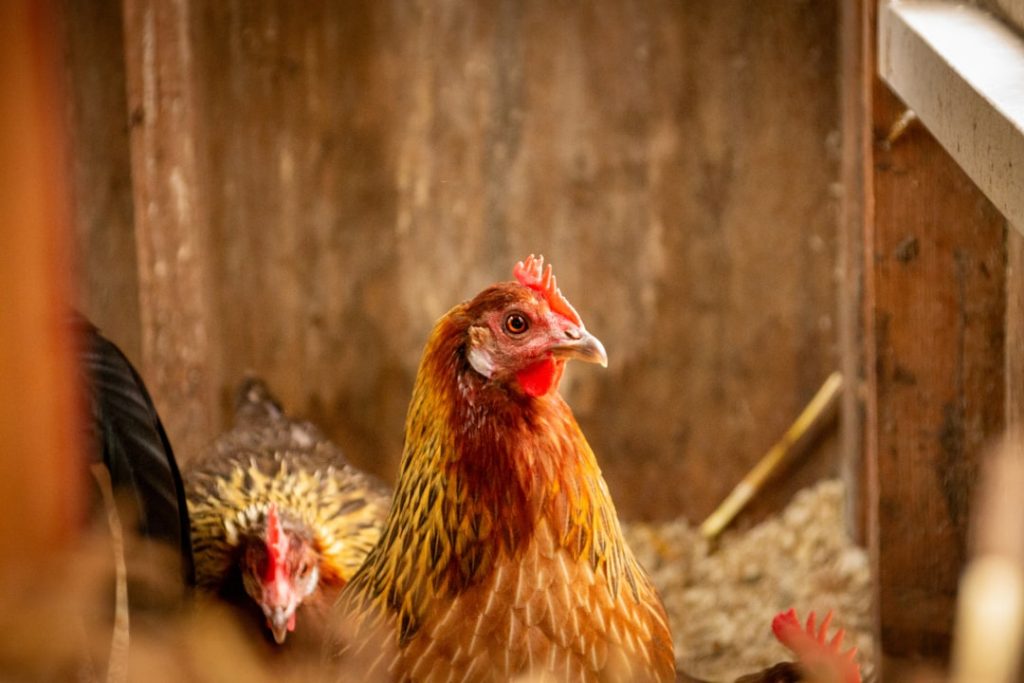When establishing a chicken-raising operation, several initial investments are necessary. A primary requirement is a suitable coop, which can range from small, basic structures for a few birds to larger, more complex setups for bigger flocks. Essential equipment includes feeders, waterers, and bedding materials for the coop.
While these initial costs can be significant, they are crucial for ensuring a safe and comfortable environment for the chickens. The cost of acquiring the chickens themselves is another important consideration. Prices vary based on breed and age.
Those starting with chicks will need to invest in a brooder to provide warmth and protection until the birds are old enough to move to the main coop. The total initial investment for raising chickens can fluctuate considerably depending on flock size and the quality of infrastructure chosen.
Table of Contents
Key Takeaways
- Initial investment for raising chickens includes purchasing a coop, feeders, waterers, and chickens themselves.
- Daily care and maintenance involves providing fresh water, feeding chickens, and cleaning the coop regularly.
- Space and housing requirements for chickens include providing at least 2-3 square feet of space per bird and a secure coop to protect them from predators.
- Predators such as foxes, raccoons, and birds of prey can pose a threat to chickens, so it’s important to secure the coop with locks and wire mesh.
- Health and disease management involves regular health checks, vaccinations, and keeping the coop clean to prevent the spread of diseases.
Daily Care and Maintenance
Providing Fresh Food and Water
One of the most important aspects of daily care is providing fresh food and water for your chickens. This means regularly refilling feeders and waterers to ensure that your chickens have access to the nutrition and hydration they need to thrive.
Cleaning the Coop
In addition to providing food and water, you’ll also need to clean the coop on a regular basis. This involves removing soiled bedding, cleaning out the nesting boxes, and ensuring that the coop is free from any potential health hazards. Regular cleaning not only helps to keep your chickens healthy, but it also helps to prevent unpleasant odors and pests from taking up residence in the coop.
Monitoring Health and Hygiene
Finally, daily care also involves monitoring your chickens for any signs of illness or injury. Being attentive to your flock’s health can help you catch any potential issues early on and seek appropriate veterinary care if necessary.
Space and Housing Requirements

When it comes to space and housing requirements for chickens, there are a few key factors to consider. First and foremost, it’s important to provide enough space for your chickens to move around comfortably. Overcrowding can lead to stress and aggression among the flock, so it’s important to provide ample space both inside the coop and in the outdoor run.
In terms of housing, the coop should provide protection from predators and the elements. This means ensuring that the coop is secure from potential threats such as raccoons, foxes, and birds of prey. Additionally, the coop should be well-ventilated to prevent moisture buildup and allow for proper air circulation.
Nesting boxes should also be provided for your hens to lay their eggs in a safe and comfortable environment. Overall, providing adequate space and housing for your chickens is essential for their health and well-being. It’s important to consider these factors when planning for your flock and investing in the necessary infrastructure.
Predators and Security
One of the biggest challenges of raising chickens is protecting them from predators. There are a variety of potential threats to consider, including raccoons, foxes, coyotes, birds of prey, and even domestic pets. To keep your chickens safe, it’s important to invest in secure fencing and coop construction.
This may involve burying wire mesh around the perimeter of the coop to prevent digging from predators or installing hardware cloth over windows and vents to prevent entry. In addition to physical security measures, it’s also important to consider other deterrents such as motion-activated lights or sound devices that can startle potential predators. Regularly inspecting the coop for any potential weak spots or signs of intrusion is also important for maintaining security.
Finally, it’s important to consider the security of your chickens during free-range time. If you allow your chickens to roam outside of their enclosed area, it’s important to supervise them or invest in a secure outdoor run to prevent potential attacks from predators. Overall, protecting your chickens from predators requires careful planning and investment in secure infrastructure.
Health and Disease Management
Maintaining the health of your flock is essential for successful chicken keeping. This involves regular monitoring for signs of illness or injury, as well as providing appropriate veterinary care when necessary. In addition to attentive monitoring, it’s important to invest in preventative measures such as vaccinations and parasite control.
Another key aspect of health management is providing a balanced diet for your chickens. This means offering a high-quality feed that meets their nutritional needs, as well as providing access to fresh water at all times. Additionally, providing opportunities for exercise and access to natural sunlight can help support overall health and well-being.
It’s also important to consider biosecurity measures to prevent the spread of disease within your flock. This may involve quarantining new birds before introducing them to your existing flock or implementing strict hygiene practices when handling your chickens. Overall, maintaining the health of your flock requires a combination of attentive monitoring, preventative measures, and prompt veterinary care when necessary.
Egg Production and Collection

Nutrition for Healthy Egg Production
A balanced diet is crucial for healthy egg production. You should offer your hens a high-quality layer feed that is specifically formulated for egg-laying hens. This will provide them with the necessary nutrients to produce eggs consistently.
A Clean and Comfortable Environment
In addition to a nutritious diet, your hens need a clean and comfortable environment to lay their eggs. Ensure that the nesting boxes are clean and well-maintained, and collect eggs regularly to prevent damage and pest infestations.
Environmental Factors Affecting Egg Production
Other factors can impact egg production, including daylight hours and temperature. Providing supplemental lighting during the winter months can help support consistent egg production, while ensuring your hens have access to shade during hot weather can help prevent stress and reduce the risk of heat-related issues.
By providing a balanced diet, clean nesting boxes, and appropriate environmental conditions, you can support healthy egg production and enjoy a steady supply of fresh eggs from your backyard.
End of Life Considerations
Finally, it’s important to consider end-of-life considerations when raising chickens. Chickens have a relatively long lifespan compared to other livestock animals, so it’s important to plan for their care as they age. This may involve making decisions about how you will manage older hens that are no longer laying eggs at the same rate as they once did.
Some chicken keepers choose to keep their older hens as pets, while others may opt to cull them for meat or other purposes. It’s important to consider these decisions carefully and ensure that you are prepared to handle them in a humane and responsible manner. Additionally, it’s important to consider how you will handle the remains of deceased chickens.
This may involve burial on your property or other appropriate disposal methods. Overall, end-of-life considerations are an important aspect of responsible chicken keeping that should be carefully planned for and addressed with compassion and respect for the animals in your care.
If you’re finding it hard to keep chickens, you may want to check out this article on Hannah Montana Chicken Coop. It offers valuable tips and insights on how to create a suitable environment for your chickens.
FAQs
What are the basic requirements for keeping chickens?
Chickens require a secure and predator-proof coop, access to fresh water, a balanced diet of chicken feed, and a suitable outdoor space for foraging and exercise.
How much time and effort is required to care for chickens?
Caring for chickens requires daily tasks such as feeding, watering, and collecting eggs, as well as regular cleaning of the coop and monitoring for signs of illness or injury. The time and effort required will depend on the size of the flock and the level of maintenance of the coop and outdoor space.
What are the common challenges in keeping chickens?
Common challenges in keeping chickens include predator attacks, disease and parasites, maintaining coop cleanliness, and providing proper nutrition and care. Additionally, local regulations and zoning laws may also impact the ability to keep chickens.
What are the benefits of keeping chickens?
Keeping chickens can provide a sustainable source of fresh eggs, natural pest control in the garden, and the opportunity to connect with nature and learn about animal husbandry. Chickens can also be enjoyable pets with unique personalities.
What are some important considerations before getting chickens?
Before getting chickens, it is important to consider local regulations and zoning laws, the amount of time and effort required for care, the initial and ongoing costs of keeping chickens, and the commitment to providing proper care and housing for the birds. Additionally, it is important to consider the potential impact on neighbors and the surrounding environment.
Meet Walter, the feathered-friend fanatic of Florida! Nestled in the sunshine state, Walter struts through life with his feathered companions, clucking his way to happiness. With a coop that’s fancier than a five-star hotel, he’s the Don Juan of the chicken world. When he’s not teaching his hens to do the cha-cha, you’ll find him in a heated debate with his prized rooster, Sir Clucks-a-Lot. Walter’s poultry passion is no yolk; he’s the sunny-side-up guy you never knew you needed in your flock of friends!







